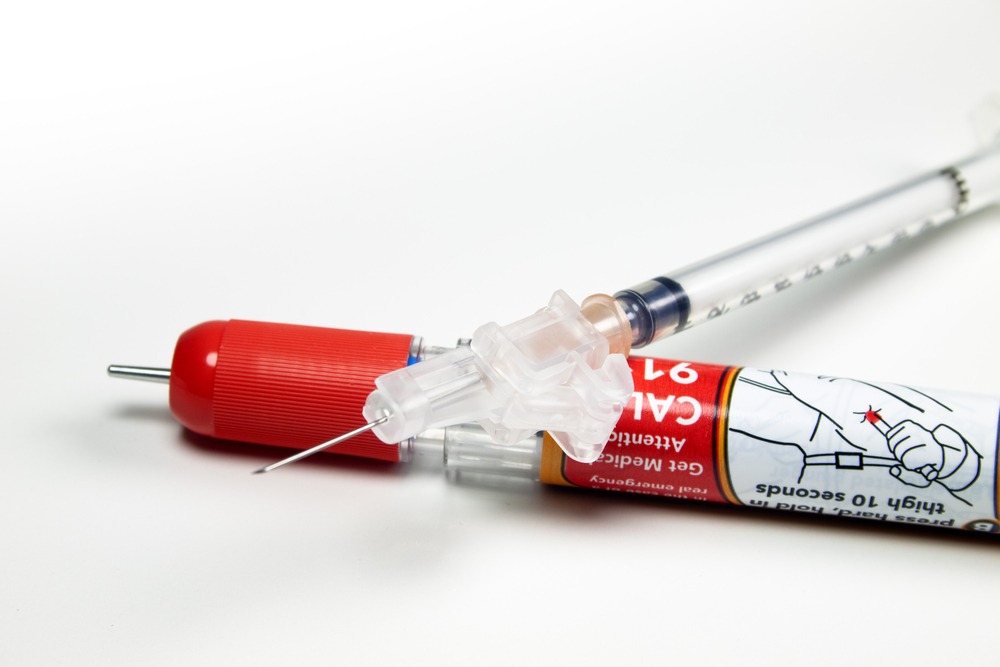 Are you allergic to bees? Or maybe peanuts? Do you carry an EpiPen?
Are you allergic to bees? Or maybe peanuts? Do you carry an EpiPen?
Athletes with severe allergies to foods, insect bites/stings, medicines, and other substances may need to possess and use a life-saving epinephrine auto-injector. While epinephrine is prohibited in-competition, it’s important for athletes subject to anti-doping rules to first prioritize life-saving treatment and pursue anti-doping approvals after a medical emergency subsides.
Learn more about epinephrine auto-injectors and anti-doping rules below.
What is an epinephrine auto-injector?
An epinephrine auto-injector is a device that automatically delivers a predetermined dose of epinephrine (a stimulant also known as adrenalin) into muscle through a needle. There are several commonly used epinephrine auto-injectors, including the EpiPen, Auvi-Q, Symjepi, and Adrenaclick, as well as a number of generic versions. Intramuscular injection of epinephrine with an auto-injector is the first line therapy for severe allergic reactions and/or anaphylaxis.
How does epinephrine work during an allergic reaction?
The use of an epinephrine autoinjector allows the body to counteract some of the most severe and dangerous symptoms of anaphylaxis, during which blood pressure drops suddenly and the airways narrow so much that it blocks breathing. Treatment with epinephrine causes blood vessels to constrict and bring blood pressure back up. It also decreases mucosal swelling through action on the α1-adrenergic receptor. Activation of the β1-adrenergic receptor increases cardiac output, while the activation of the β2-adrenergic receptor relaxes the airways (bronchodilation) to allow for more air flow into the lungs.
Is epinephrine prohibited?
Yes, epinephrine is prohibited in-competition as a stimulant on the WADA Prohibited List. Use of epinephrine out of competition is not prohibited.
In competition is defined as the period commencing at 11:59 p.m. on the day before a competition in which the athlete is scheduled to participate, through the end of the competition and the sample collection process related to the competition. WADA may approve alternative definitions for particular sports.
Do I need a Therapeutic Use Exemption (TUE) to use an epinephrine auto-injector?
An athlete should never delay any life-saving treatment, but they may need to request a retroactive TUE if they used an epinephrine autoinjector in-competition. Once the emergency has subsided, an athlete should complete a TUE Pre-Check Form on the USADA website to learn whether a retroactive TUE is required. USADA will evaluate the TUE Pre-Check Form to determine what TUE requirements apply to the particular situation and will notify the athlete accordingly.
Athletes do not need to submit a TUE application in advance of using or being in possession of an auto-injector.
What if I need to use the EpiPen in an emergency?
The athlete should use the auto-injector as needed. If the use occurred during a competition, the athlete should submit a TUE Pre-Check Form afterward, as described above.
Is it against the rules to bring an EpiPen to competitions?
Some event organizers have rules regarding the medications or equipment (such as needles) an athlete is allowed to bring to a competition. However, this does not apply to epinephrine auto-injectors. It is generally recognized that epinephrine is emergency and potentially life-saving medicine, so athletes will not incur an anti-doping violation for being in possession of epinephrine auto-injectors at a competition.
More questions?
For questions about specific products, substances, and methods, contact USADA’s Drug Reference Line at drugreference@USADA.org or call (719) 785-2000, option 2.
Read more Spirit of Sport blog posts



